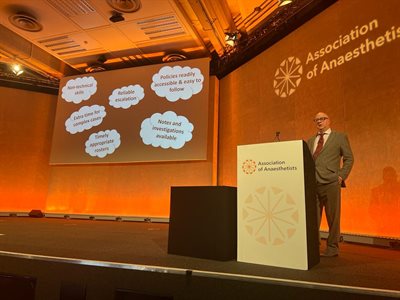NGH professor celebrates overwhelming success of national safety guidance he helped produce

Prof Chris Frerk at the launch of the guidance in London
A professor of anaesthesia and airway management from Northampton General Hospital has helped produce award-winning guidance to make operations safer for patients.
Prof Chris Frerk, a consultant anaesthetist at NGH, was part of a team that worked for five years – including throughout the Covid pandemic - to develop guidance to reduce the chance of human error in operations.
After extensive work the team produced their publication 'Human factors in anaesthesia – but with lessons for other specialties and hospitals in general' which is proving to have national importance.
The work was published in January and went on to win the President’s Award from the Chartered Institute of Ergonomics and Human Factors in June and was then recognised with the Humphry Davy Award from the Royal College of Anaesthetists in September.
Prof Frerk said: “Our whole team are delighted at the reception our work has received which looks at how we can use human factors science to improve safety in operating theatres and throughout the rest of our hospitals.
“Our team of safety scientists and clinical staff defined the best ways of planning and preparing for operations and delivering care using the kind of ideas used in especially safety conscious industries – such as the airline and nuclear industries - to reduce risk and adapted them to meet the needs of the NHS.
“These were then translated into a list of good practice actions for hospitals to implement to maximise safety in theatres.”
The guidance was pulled together by 15 expert members of a Working Party established by the Difficult Airway Society (DAS) and the Association of Anaesthetists made up of clinical staff and safety experts.
The final paper was submitted to the journal Anaesthesia by Prof Frerk and Dr Fiona Kelly - a consultant anaesthetist at Royal United Hospital in Bath. It has already been accessed more than 25,000 times by clinicians across the UK and around the world.
Prof Frerk said: “Our recommendations are wide ranging and are based around a safety concept which helps stop small errors escalating into bigger ones.
“We looked at things like how to choose the safest equipment, which staff can use easily and with a minimal chance or error, at how operating theatres are designed to make it easy for staff to do their job, and at simple things like how drugs are packaged – eg in different coloured packaging to prevent mistakes.
“The concept is that the better designed, planned, and tested your systems are the less likely things are to go wrong. And if one small thing does go wrong you have checks further down to prevent it escalating into a bigger mistake.
“Human factors science aims to make it as easy as possible for people to do the right thing and to make it as difficult as possible for them to get things wrong.”
NGH ahead of the game
NGH was already ahead of the field in many of these areas when the guidance was published.
Examples of work already done at the hospital includes:
- The procurement team working closely with clinical staff to choose the safest equipment
- Using prefilled syringes for emergency drugs in the operating theatres to reduce any chance of syringes being wrongly prepared
- Having names and job roles on the hair coverings used by theatre staff so that even when teams change all staff (and patients) know who-is-who
- Using simulation to practice emergency drills in theatre and other areas of the hospital so staff will be prepared and practiced in case of a real emergency
- Using human factors science in hospital investigations to try to make systems as safe as possible.
Prof Frerk is looking forward to helping make the guidance part of everyday working throughout the hospital, not just in the operating theatres. The whole guideline team want to see the guidance implemented across the NHS to make hospital care safer for everyone.
He said: “At a national level drug companies and equipment manufacturers have been approaching our team already looking for advice on how to improve their products to make them easier and safer for doctors nurses and other hospital staff to use in the future.”
NGH’s Medical Director Mr Hemant Nemade said: “I am delighted the collaborative work that Chris has done on reducing the risks of error in theatre has been so well received at a national level.
“The impact of this guidance is already being felt and will be felt for years to come in equipment manufacture, the packaging of drugs, and many other aspects of the way hospitals put systems in place to be as safe as possible.”
Posted on Monday 18th December 2023